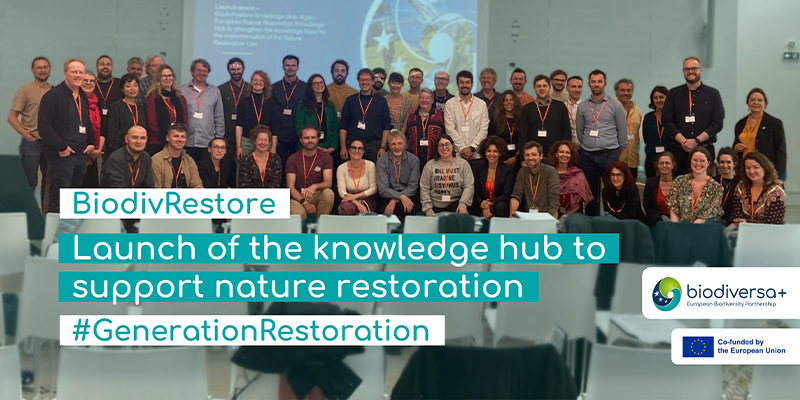We’re thrilled to announce the launch of the BiodivRestore Knowledge Hub!
A global context
Building on the success of the BiodivRestore call, Biodiversa+ partners have decided to establish a pan-European Knowledge Hub on Nature Restoration. The primary purpose of this hub is to facilitate the exchange of knowledge, research, and technological expertise related to nature restoration. By doing so, it aims to support countries in developing and implementing their National Restoration Plans, aligning with the EU Biodiversity Strategy 2030 and the Global Biodiversity Framework.
After a call for interest published in February 2024, 52 experts from various initiatives were selected. They gathered in Paris on 30 and 31 May 2024 for the launch event.
The event began with a plenary session providing context for the hub, including international and European initiatives, and highlighting the importance of the European Commission’s proposal for a Nature Restoration Law (NRL), as well as the role that scientific research can play in influencing public perception and policy.
Two task forces
As the Knowledge Hub is based on two Task Forces, break-out groups then held separate discussions which generated a wealth of ideas.
Focusing on practical ways to increase knowledge sharing, collaboration, and effective implementation, the Implementation Task Force discussed ways to establish best practices and promote cross-border and interdisciplinary coordination. The group mapped out their priorities and activities in key workstreams, highlighting the need for science-based guidance and capacity-building. This will, for instance, involve the production of resources for practitioners and governance bodies, including restoration guidelines, a habitat-specific database, and policy documents, and the enhancement of restoration skills through activities such as workshops, seminars, or mentoring.
Recognising the need for a holistic approach, the Research and Innovation (R&I) Task Force stressed the importance of interdisciplinary collaboration (including social sciences and economics) and stakeholder engagement (communities, policymakers, and private landowners). This led to the creation of three key workstreams: 1) Conflict resolution, which tackles stakeholder involvement, aligning research with policy needs, and addressing national differences in restoration approaches; 2) Monitoring and lesson learning, which goes beyond just monitoring to include learning from past efforts, setting standards and targets, and incorporating adaptive management practices; and 3) Future R&I agenda, which will explore future research needs in the field of restoration.
Future plans
Overall, the event laid the groundwork for the Knowledge Hub to move forward by mapping the expertise of its members and discussing the format, structure and timeline of its activities. Based on these discussions, the Hub will develop its work and resource plans in the coming weeks.
More on that and more news from the Hub soon! In the meantime, don’t hesitate to visit the Hub page!




